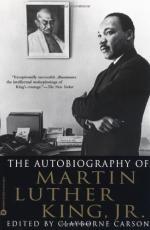
|
| Name: _________________________ | Period: ___________________ |
This quiz consists of 5 multiple choice and 5 short answer questions through Chapter 31: The Poor People's Campaign, Chapter 32: Unfulfilled Dreams.
Multiple Choice Questions
1. What was it King's college training did, especially during his first two years?
(a) Erased many doubts from his mind.
(b) Brought many doubts to his mind.
(c) Brought some doubts, mostly answers to his mind.
(d) Reinforced many beliefs that he had.
2. Where in Washington did King deliver an address on 17 May 1957?
(a) Crusade for Citizenship.
(b) Pilgrimage to Vote.
(c) Prayer Pilgrimage for Freedom.
(d) March for Freedom.
3. It was primarily under Edgar S. Brightman and L. Harold DeWolf that King studied what?
(a) Calvinistic philosophy.
(b) Personalistic philosophy.
(c) Socialistic philosophy.
(d) Christian theology.
4. What did King note came out in the New York Times about his injury?
(a) He would have died without blood transfusion.
(b) He would have died without prompt medical attention.
(c) His survival was miraculous.
(d) He would have died if he had sneezed.
5. When did King initially call for a halt to the bombing of North Vietnam?
(a) 21 May 1966.
(b) 12 August 1965.
(c) 16 February 1965.
(d) 10 January 1966.
Short Answer Questions
1. King described which individual as his "closest associate and most trusted friend" from the start of the boycott?
2. The 1964 Nobel Prize for Peace was received by King, but whom did he feel truly deserved the award?
3. King elaborated on what land reform movement in India which was virtually unknown in the U.S.?
4. In the summer of 1957, the Southern Christian Leadership Conference (SCLC) planned a campaign to enforce what?
5. On 10 July 1967, at a "Freedom Sunday" rally, King initiated a drive to make Chicago an "open city" for what?
|
This section contains 281 words (approx. 1 page at 300 words per page) |

|




